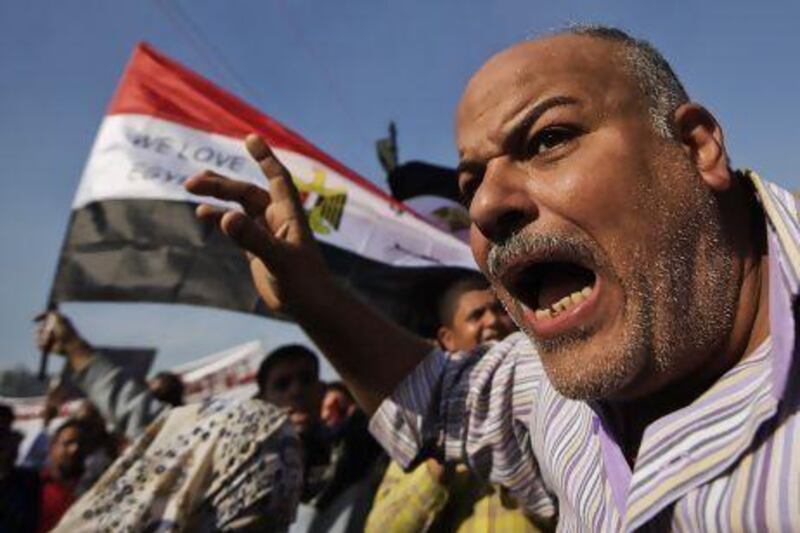CAIRO // Thousands of people gathered in Tahrir Squre yesterday, filling the air with chants once used against Hosni Mubarak, now recycled for president Mohamed Morsi.
The Islamist leader is firmly out of favour with large sections of Egyptian society after awarding himself new powers and overseeing the rushed approval of a controversial constitution.
The high turnout and profile of the demonstration in the square that was the centre point of last year's uprising further heightened a feeling, after more than a week of protests, that Mr Morsi was facing his most serious challenge since taking office nearly six months ago
It also ratcheted up anticipation of counter-rallies by the president's supporters today.
"The revolution is back again, leave means go!" sang a crowd of young men, some of them from a socialist political group, while playing a drum and dancing with a streaming Egyptian flag held aloft. The people gathered seemed mainly drawn from the more secular, liberal parts of the country's diverse society, but they had a variety of objections to the way the country's first elected, civilian president had conducted himself.
"I never came to the square before," said Janet Moussa, a middle-aged pharmacist who was there with her husband. "But we felt we would die if we did not come. We didn't vote for Morsi, but we said we'd wait, and see if he did something for the country, and if he did we would be with him. But he has not."
"He is a dictator!" her husband, Ramsi Niseen, interjected angrily, a word bandied about by many of those gathering. "This is no time for this - the country is weak," said Saber Abdelkarim, an imposing teacher in thick glasses, "it's an attack against the judiciary." Like most people there, he called for the president to, at least, step back from a constitutional decree giving his edicts immunity from judicial oversight, and said that he would vote against a constitution hastily agreed upon early yesterday morning, should it be put to a referendum.
The document, finalised by an assembly dominated by the supporters of the Islamist parties who garnered the majority of votes, is a reworked version of the 1971 constitution, which has not changed dramatically but which preserves some of the privileges of the military and has some controversial provisions, including one which bans "insulting the human," which rights groups say is a broad wording that could be used to limit freedom of speech.
But it was not the content of the document that irked most people in Tahrir yesterday, so much as the way that it was produced - hastily passed under threat of the judiciary dissolving the entire assembly, after most of the non-Islamist members of the 100-member body had resigned. "These people should have been people who represented Egyptian society," said Osama Azzut, a garbage collector and member of the substantial Christian minority. "They ended up getting people who represented their own selves."
Mr Assut said that he would have liked to see constitutional experts, human-rights bodies and trade union leaders work on the document. A referendum, he said, would be meaningless because most of Egypt's people did not understand the legal language.
Leaders of the Muslim Brotherhood Islamist movement from which Mr Morsi draws most of his support, and other Islamists, have called for a counter-rally today, although they moved the planned place from Tahrir Square in an attempt to avoid confrontation.
Some of those gathered yesterday were disdainful of the idea. "They are free to express their opinion," said Samar Sayed, a doctor participating in the protest. "But a protest to support the president's decision only happens in dictatorships - this is just a show of force."
But not far from the crowds, many people were cynical about the gathering.
"It's not necessary, there's no purpose to it," said Mohammed Abdo, a weary-looking manager of a shop selling the Egyptian delicacy koshari. "We didn't have enough time to judge what he did, we should wait one or two years, and assess. Egypt has 80 million politicians....but finally, we end up with nothing."
afordham@thenational.ae





